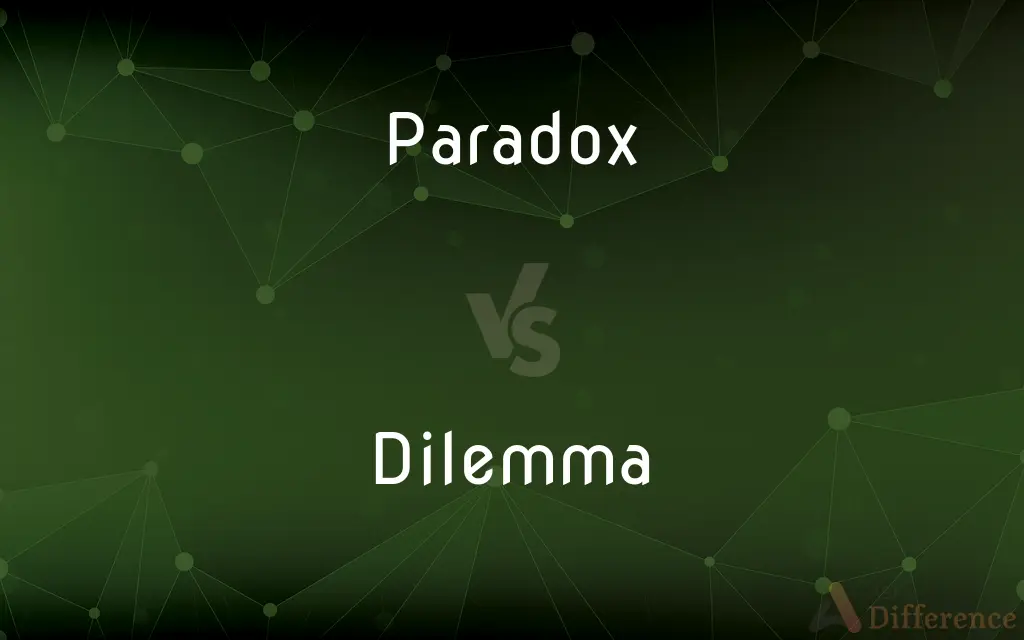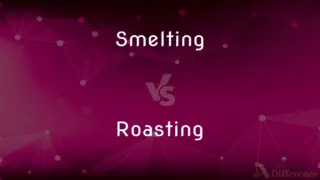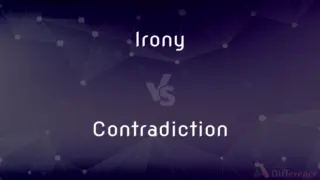Paradox vs. Dilemma — What's the Difference?
Edited by Tayyaba Rehman — By Fiza Rafique — Updated on April 1, 2024
Paradox involves a statement that contradicts itself or defies logic, while a dilemma is a situation requiring a choice between equally undesirable alternatives.

Difference Between Paradox and Dilemma
Table of Contents
ADVERTISEMENT
Key Differences
A paradox is a concept or statement that, despite seemingly sound reasoning from acceptable premises, leads to a conclusion that seems logically unacceptable or self-contradictory. Paradoxes are used to challenge the mind, provoke thought, and illustrate that our understanding or interpretations can be flawed. In contrast, a dilemma involves a situation in which a difficult choice has to be made between two or more alternatives, especially equally undesirable ones. It presents a problem that demands a decision, often involving a moral or ethical quandary where each potential course of action carries some form of compromise or risk.
Paradoxes serve as intellectual or philosophical puzzles that can question our assumptions and push the boundaries of knowledge and logic. They often do not require a resolution but instead aim to highlight inconsistencies in our understanding or the limitations of our reasoning. Dilemmas, however, demand practical resolution, and the decision-making process can reveal values, priorities, and character.
While a paradox might exist purely in the realm of thought, engaging with a dilemma involves real-world consequences and ethical considerations. The engagement with a paradox is primarily intellectual, stimulating exploration and debate. In contrast, facing a dilemma often necessitates an actionable choice, with emotional and ethical dimensions playing significant roles in the decision-making process.
Both concepts are crucial in their contexts: paradoxes in stimulating critical thinking and questioning within philosophical, mathematical, or logical inquiries; dilemmas in ethical, moral, and practical decision-making scenarios, forcing individuals or groups to confront the implications of their choices and the values they hold dear.
Comparison Chart
Definition
A statement or proposition that, despite sound reasoning, leads to a conclusion that seems senseless, logically unacceptable, or self-contradictory.
A situation in which a difficult choice has to be made between two or more alternatives, often equally undesirable.
ADVERTISEMENT
Nature
Intellectual puzzle, conceptual challenge.
Practical problem requiring a decision.
Purpose
To stimulate thought, question assumptions, and explore the limits of logic.
To resolve a situation involving a tough choice, often with moral implications.
Examples
"This statement is false." (Liar Paradox)
Choosing between lying to save a friend from harm or telling the truth and causing pain.
Outcome
Provokes debate and philosophical inquiry; may not have a practical resolution.
Leads to a decision with real-world consequences and reflections on values.
Compare with Definitions
Paradox
A statement or concept that contradicts itself or defies intuition.
The statement I always lie is a paradox because if it's true, it must be false.
Dilemma
Leads to actions that reflect personal or collective values and priorities.
How one resolves a moral dilemma can significantly influence their character and ethical standpoint.
Paradox
Often abstract and theoretical, challenging logic and understanding.
Paradoxes like Schrödinger's cat challenge our understanding of reality and quantum mechanics.
Dilemma
A situation requiring a choice between options that are or seem equally unfavorable or mutually exclusive.
A whistleblower faces the dilemma of exposing wrongdoing and risking retaliation or staying silent and feeling complicit.
Paradox
Intellectual and theoretical, often without a need for resolution.
Philosophical debates frequently explore paradoxes to test the limits of logic.
Dilemma
To resolve situations where making a decision is difficult but necessary.
Legal dilemmas may require balancing individual rights against societal needs.
Paradox
To provoke thought and question the foundations of knowledge and belief.
Paradoxes in mathematics often lead to significant breakthroughs by challenging assumptions.
Dilemma
Involves practical decision-making with real-world implications.
Corporate leaders often face dilemmas that affect their employees, customers, and stakeholders.
Paradox
Broadens perspectives and deepens understanding of complex issues.
Engaging with paradoxes can reveal the complexity and nuance of philosophical concepts.
Dilemma
Practical and often involves moral or ethical considerations.
Ethical dilemmas in medicine often involve deciding between patient autonomy and the well-being of the patient.
Paradox
A paradox is a logically self-contradictory statement or a statement that runs contrary to one's expectation. It is a statement that, despite apparently valid reasoning from true premises, leads to a seemingly self-contradictory or a logically unacceptable conclusion.
Dilemma
A dilemma (Greek: δίλημμα "double proposition") is a problem offering two possibilities, neither of which is unambiguously acceptable or preferable. The possibilities are termed the horns of the dilemma, a clichéd usage, but distinguishing the dilemma from other kinds of predicament as a matter of usage.
Paradox
A seemingly absurd or contradictory statement or proposition which when investigated may prove to be well founded or true
The uncertainty principle leads to all sorts of paradoxes, like the particles being in two places at once
Dilemma
A situation that requires a choice between options that are or seem equally unfavorable or unsatisfactory.
Paradox
A statement that seems to contradict itself but may nonetheless be true
The paradox that standing is more tiring than walking.
Dilemma
Usage Problem A problem that seems to defy a satisfactory solution.
Paradox
A person, thing, or situation that exhibits inexplicable or contradictory aspects
"The silence of midnight, to speak truly, though apparently a paradox, rung in my ears" (Mary Shelley).
Dilemma
(Logic) An argument that presents two alternatives, each of which has the same consequence.
Paradox
A statement that is self-contradictory or logically untenable, though based on a valid deduction from acceptable premises.
Dilemma
A circumstance in which a choice must be made between two or more alternatives that seem equally undesirable.
Paradox
An apparently self-contradictory statement, which can only be true if it is false, and vice versa.
"This sentence is false" is a paradox.
Dilemma
A difficult circumstance or problem.
Paradox
A counterintuitive conclusion or outcome.
It is an interesting paradox that drinking a lot of water can often make you feel thirsty.
Dilemma
(logic) A type of syllogism of the form "if A is true then B is true; if C is true then D is true; either A or C is true; therefore either B or D is true".
Paradox
A claim that two apparently contradictory ideas are true.
Not having a fashion is a fashion; that's a paradox.
Dilemma
(rhetoric) Offering to an opponent a choice between two (equally unfavorable) alternatives.
Paradox
A thing involving contradictory yet interrelated elements that exist simultaneously and persist over time.
Dilemma
An argument which presents an antagonist with two or more alternatives, but is equally conclusive against him, whichever alternative he chooses.
Paradox
A person or thing having contradictory properties.
He is a paradox; you would not expect him in that political party.
Dilemma
A state of things in which evils or obstacles present themselves on every side, and it is difficult to determine what course to pursue; a vexatious alternative or predicament; a difficult choice or position.
A strong dilemma in a desperate case!To act with infamy, or quit the place.
Paradox
An unanswerable question or difficult puzzle, particularly one which leads to a deeper truth.
Dilemma
State of uncertainty or perplexity especially as requiring a choice between equally unfavorable options
Paradox
(obsolete) A statement which is difficult to believe, or which goes against general belief.
Paradox
(uncountable) The use of counterintuitive or contradictory statements (paradoxes) in speech or writing.
Paradox
A state in which one is logically compelled to contradict oneself.
Paradox
The practice of giving instructions that are opposed to the therapist's actual intent, with the intention that the client will disobey or be unable to obey.
Paradox
A tenet or proposition contrary to received opinion; an assertion or sentiment seemingly contradictory, or opposed to common sense; that which in appearance or terms is absurd, but yet may be true in fact.
A gloss there is to color that paradox, and make it appear in show not to be altogether unreasonable.
This was sometime a paradox, but now the time gives it proof.
Paradox
(logic) a self-contradiction;
`I always lie' is a paradox because if it is true it must be false
Common Curiosities
Are all paradoxes unsolvable?
Not all paradoxes are unsolvable; some may be resolved with deeper understanding or changes in perspective, while others are designed to highlight limitations in our thinking.
How do you resolve a dilemma?
Resolving a dilemma often involves analyzing the consequences, considering ethical principles, and making a decision based on the best possible outcome or alignment with personal or societal values.
How are paradoxes useful in philosophy and science?
Paradoxes challenge existing knowledge and assumptions, encouraging deeper inquiry and often leading to significant philosophical insights or scientific breakthroughs.
Do dilemmas always have a right answer?
Dilemmas often do not have a universally "right" answer; the decision may depend on the context, values, and perspectives of the decision-maker.
Can a paradox be solved?
While some paradoxes are resolved through advancements in knowledge or logic, others remain as tools for thought and exploration without definitive resolution.
Can a situation be both a paradox and a dilemma?
A situation may contain elements of both if it presents a logical inconsistency (paradox) that requires a choice to be made (dilemma), but typically, they are distinct in nature.
What is a paradox?
A paradox is a seemingly absurd or self-contradictory statement or proposition that, upon closer inspection, might reveal a deeper truth or complexity.
What is a dilemma?
A dilemma is a situation in which a person must choose between two or more alternatives that are or seem equally undesirable or mutually exclusive.
What makes a decision a dilemma?
A decision becomes a dilemma when it involves a difficult choice between options that are equally unfavorable or when making a choice compromises one's values or principles.
Is facing a dilemma always negative?
Facing a dilemma can be challenging, but it also presents an opportunity for growth, learning, and clarification of one's values and priorities.
Share Your Discovery

Previous Comparison
Smelting vs. Roasting
Next Comparison
Irony vs. ContradictionAuthor Spotlight
Written by
Fiza RafiqueFiza Rafique is a skilled content writer at AskDifference.com, where she meticulously refines and enhances written pieces. Drawing from her vast editorial expertise, Fiza ensures clarity, accuracy, and precision in every article. Passionate about language, she continually seeks to elevate the quality of content for readers worldwide.
Edited by
Tayyaba RehmanTayyaba Rehman is a distinguished writer, currently serving as a primary contributor to askdifference.com. As a researcher in semantics and etymology, Tayyaba's passion for the complexity of languages and their distinctions has found a perfect home on the platform. Tayyaba delves into the intricacies of language, distinguishing between commonly confused words and phrases, thereby providing clarity for readers worldwide.















































